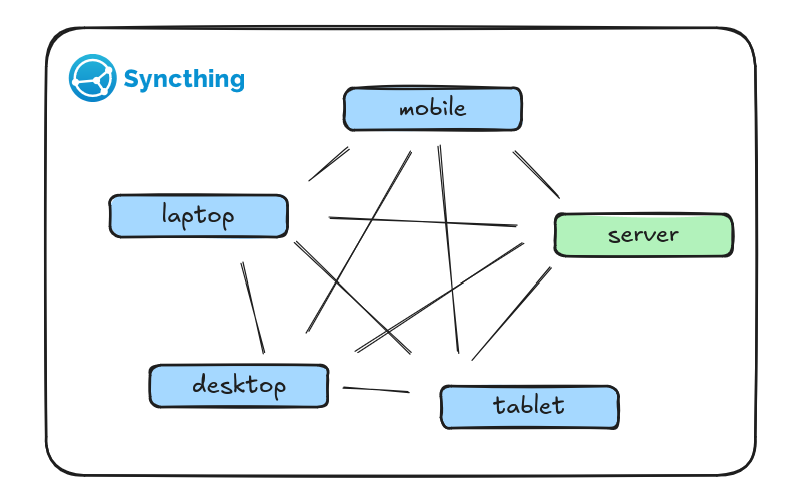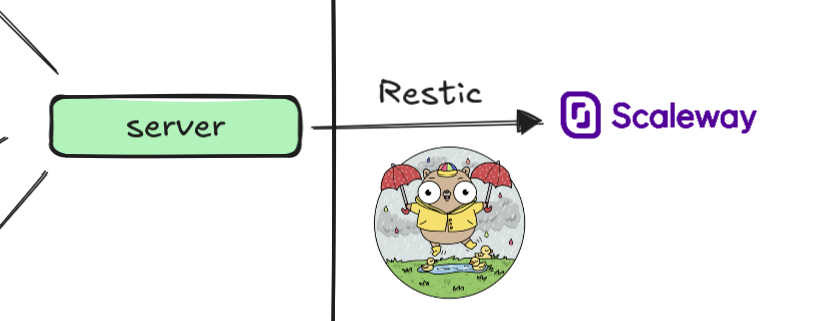
Bulletproof Your Files in 2025: The Syncthing + Restic Setup
📅 Published: • Thomas Queste
Lost files? Outdated versions? A proper backup strategy eliminates these risks.
Here’s my battle-tested setup and the solution I recommend for 2025.
TL;DR
- Goal: multiple copies of the files, and an offsite backup
- Syncthing copies the files between devices: laptop, desktop, mobile, tablet…
- Restic backups the files to a remote location
Syncthing (sync files)
Syncthing is an open-source solution that synchronizes files across devices without cloud dependencies. It’s reliable, secure, and just works.
Key Features:
- Automatic Sync: Changes are detected and synced in real-time between your devices
- Ease of Setup: Install, link devices, and select folders to sync.
- Privacy: Data is encrypted during transmission.
- Cross-platform: Linux, Windows, Android…
Setup
- Install Syncthing on all devices (phone, tablet, laptop, desktop, server)
- Link devices via ID or QR code
- Select folders to sync
There is no credential, no authentication, as devices need mutual authentication.
Pure magic!
How I use it
Some folders are shared between devices, but not all.
For example, the music directory is shared between all devices, but documents are not shared with my phone, as I fear it to be stolen or lost.
But it is just a matter of ticking a box and accepting the folder on the other side.

Restic (backup files)
Restic can be impressive but remains simple in concept. It’s designed for secure and efficient backups.
You can think of Restic as your personal vault, where data is encrypted and deduplicated for efficiency.
You can back up your files to a variety of storage backends, a cloud provider or an external drive.
Key Features
- Encryption: all data is secured and never leave your computer unencrypted
- Deduplication: Identical data blocks are stored only once, saving space and so, costs
- Incremental Backups: Only changes since the last backup are saved, reducing time and storage usage
- Cross-platform: Linux, Windows…
My Setup
- Central
serverdevice collects all backup-targeted folders. This is my self-hosted server, which is always on. - Automated backups to Scaleway object storage (twice daily)
- Retention policy: 30 daily, 8 weekly, 12 monthly, 2 yearly snapshots
As per the provider, I went from Backblaze (aka “b2”) to Scaleway, because I have fees paying in dollar with my French bank. It was a matter of using restic sync between the old and the new providers. I would recommend Scaleway if you pay in euros.

Next Up: Ransomware-Proof backups
I wrote the following article: Ransomware-Resistant Backups with Kopia and Scaleway Object Lock
The goal here is to protect against someone deleting, or altering the backups.
To achieve this level of protection, Kopia is needed
Kopia is an alternative to Restic and also offers great features and has a User Interface.
For this article, I focused on Restic, because Restic is stable, maybe “less modern”, but for backups, the reliable aspect is key.
Conclusion
This Syncthing + Restic combo delivers bulletproof file management: seamless sync, encrypted backups, and peace of mind.
Syncthing keeps everything effortlessly in sync across your devices, while Restic ensures your data is safe and recoverable even in a worst-case scenario.
By the way, about the software point-of-view, the changelogs of Restic are awesome, with a summary then details about each point. A big shoutout to the maintainers!
See you soon for the next article about Ransomware protection.
